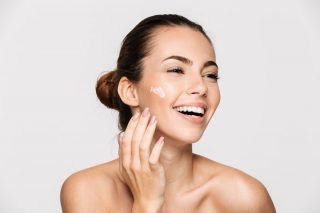One medical dictionary cites premature aging as the process of growing old, typified by a gradual slowing down of the metabolism and breakdown of tissues, often accompanied by endocrine changes”. That applies to our skin too, well, every part of our body. Aging from the inside is caused by hormonal influences and genetics. While from the outside, in a nutshell, premature skin aging is due to oxidative stress. Under the umbrella of ‘oxidative stress’ are factors such as the sun, pollution, smoking, insufficient nutrition, and inappropriate skincare regimen.
However, that doesn’t mean the end – now that you have had sufficient warning and you are approaching your 30s, start NOW with these nine fantastic ways to begin age-proofing your skin for the future.
9 Ways To Combat Premature Aging
1. Buy yourself a gentler face wash
Your face will need more of a gentle touch because by this time it is becoming less oily and more sensitive. It’s time to put away the drying acne washes. Get a mild face wash that makes use of essential fatty acids to deliver intense hydration, as well as green tea to fight against damage from free radicals.
2. Time to start using retinoids
As time passes, collagen, which keeps your skin plump, starts reducing. Experts agree that the best line of defense is to use a retinoid, which is a prescription-strength version of vitamin A.
3. Start upgrading your SPF routine

Dean Drobot/Shutterstock
Now you need to start regularly using sunscreen with an SPF of over 30 as well as anti-aging eye creams. You will prevent those old-looking age spots and discoloration of your skin and keep it supple looking.
4. You need to up your face cream to something richer
Oil glands of the face become less active the older you get, so it means switching over from your normal face cream to something richer, one that will trap water in the skin and plump up the deep crevices that are starting to develop. Don’t forget to extend this rich formula down your neck as well. Additionally, since the eyes can show many dominant age marks, pick anti-aging eye creams that are rich too.
5. Definitely what you put in will be what you get out
What goes in will show up on the outside of your body. See how important it is to follow a healthy diet plan and to eat foods that will nourish your skin? Avoid alcohol and foods high in sugar and fat. As you get older, these types of carbs make you age faster because they break down glucose. Consume more proteins such as fish, lean meats, legumes, and beans, which help to build up collagen – which means increasing your vitamin C levels too. Start discovering the link between nutrition and skin aging.
6. Start taking supplements
It might not sound believable but some skin supplements can restore dewiness to aging skin. Omega 3, which is found in certain kinds of seafood, such as salmon, helps to keep skin moist and might even be able to delay the maturing process of the skin because of the moisture it offers. If you don’t eat fish and fish products, try taking omega-3 supplements or flaxseed, and another benefit is that it offers anti-inflammatory effects as well.
7. Exfoliating weekly keeps skin fresher and brighter
It is natural for our skin to shed dead skin cells regularly. A new layer is created around every 28 days. As we age, that process slows down a bit, leading to dull-looking skin.
8. Fill up on fermented foods
Most of us know or have heard that foods such as sauerkraut, kombucha, kimchi, and tempeh are excellent for gut health. Also, gut health is imperative for youthful-looking skin.

casanisa/shutterstock
Fermented foods have many antioxidants in them as well as anti-inflammatory properties. Craig Kraffert, a board-certified dermatologist, says that fermented extracts are known to calm the skin and brighten it. So, make sure to add fermented foods to your list, and you are on your way to a healthy diet plan.
9. Sleep on a silk pillowcase on your back
Not getting sufficient sleep makes you susceptible to heaps of health problems, from cardiovascular disease to anxiety and depression. You need a good night’s rest for healthy skin. Do you sleep on your side? If you are, you could be causing lines to develop on your cheek that is pressed against the pillow while you sleep. One doctor suggests switching to sleeping on your back, and not only to prevent wrinkles. Sleeping on your back also eases back and neck pain and fights acid reflux.
Conclusion
“Your skin is a living organ that changes over time”. That’s what Jessica Wu, a Los Angeles dermatologist says. She is also the author of Feed Your Face and says “Adjusting your skincare to accommodate these changes will help your skin stay healthy and looking its best.”
As we have seen above, many things cause our skin to age. One thing none of us can avoid is the natural aging process, and it certainly plays a key role because over time, we all get lines on our faces, and our faces lose that youthful fullness, becoming thin and dry. Our genes control a lot when these changes happen. We can influence other aging factors, though, such as our environment and our lifestyle choices. By taking some preventive and immediate actions, especially as we say goodbye to the youthful 20s, we can slow down the effects of this type of aging. Start as soon as possible because they can make a big difference!
Oh, and don’t forget if you have stress in your life, it’s going to cause all 9 solutions to be in vain because, ‘If you are stressed, you get pimples, and if you cry, you’ll get wrinkles, so why don’t you smile and get dimples!’
References
[1] https://www.nia.nih.gov/health/skin-care-and-aging
[2] https://www.ncbi.nlm.nih.gov/pmc/articles/PMC3583891/


![women [longevity live]](https://longevitylive.com/wp-content/uploads/2020/01/photo-of-women-walking-down-the-street-1116984-100x100.jpg)










